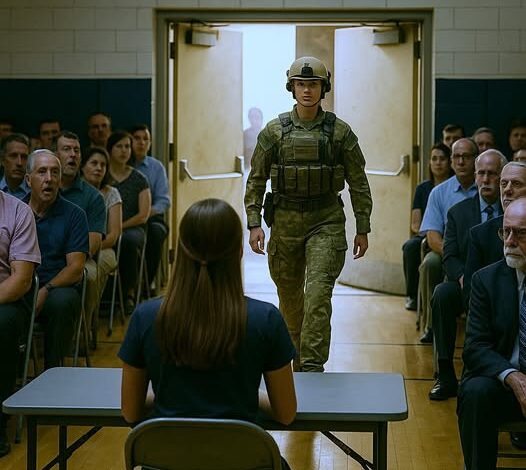They teased the girl for saying her mom did dangerous missions, Then the door opened, and the group that stepped inside froze the entire classroom in place

Embry Callister had never expected a private administrative review to turn into a public spectacle, but that’s exactly what happened. The Mercer County Community Center’s old basketball court was packed with nearly two hundred people, all waiting for the same thing: to watch a sixteen-year-old get humiliated. Whispers. Snickering. Phones out. This wasn’t a hearing anymore. It was a firing squad with bleachers.
Embry sat alone at a folding table in the center of the room, spine straight, chin level. She’d been mocked at school for months for one reason: her college admissions essay said her mother was a Navy SEAL who “went on dangerous missions.” That should’ve been confidential, but someone leaked the essay, and the town had treated it like an invitation to feed.
Superintendent Lowell Hargrove, a man who looked like he polished his ego more often than his shoes, stood at the front behind a raised desk. He held her essay up like evidence in a criminal trial. “We are here,” he announced, his voice booming through the speakers, “to address the highly questionable claims made by Miss Callister.”
The crowd leaned in. Embry felt every stare like static on her skin. She searched for one face that wasn’t hostile. In the very back row sat her grandfather, Retired Colonel Thaddeus Callister, posture stiff, expression unreadable. He gave her a near-invisible nod. Their old signal: hold the line.
Her English teacher, Ms. Winslet, stepped up to read from the essay. Her hands shook. “While other mothers taught their daughters to bake,” she read, “mine taught me breath-holding drills and cold-water conditioning. My mother, Commander Zephyr Callister, completed training alongside DEVGRU operators. Her record remains classified.”
A ripple of laughter passed through the crowd. Someone muttered “pathological liar.” Another said, “She watches too many movies.”
Hargrove cut the reading short. “Enough. Dr. Fleming?” The town psychiatrist stood with the confidence of a man used to being wrong but respected anyway. “This appears to be a case of elaborate fantasy construction,” he said. “A coping mechanism for parental abandonment.”
“I wasn’t abandoned,” Embry said quietly. “And I didn’t lie.”
Hargrove responded by producing a document with theatrical flair. “Here is your mother’s official military record. An administrative specialist. Desk work. Honorably discharged eight years ago. No special operations. No deployments. No SEAL training.”
The laughter grew. Some people filmed her reaction.
Embry didn’t flinch. “That’s her cover file.”
More laughter.
Outside the building, unnoticed, a black SUV rolled up to the curb. Inside, Colonel Callister glanced at his watch again. He was counting down to something.
Mayor Sutcliffe stood next, all smug authority. “Miss Callister, if your mother was truly a SEAL, surely you can answer some basic questions. Explain these ‘missions.’ Describe the training.”
Embry answered only what she was allowed. Precise. Minimal. When a Vietnam veteran in a wheelchair — Warren Pike — demanded specifics about HAHO versus HALO jumps, she delivered the definitions flawlessly. Pike’s jaw tightened, but Hargrove swept her explanation aside.
“Impressive imagination,” the superintendent said dryly. “But lies are still lies.”
The crowd seemed ready to cheer as he pressed on. “Where is this heroic mother of yours? Why isn’t she here to defend you?”
Colonel Callister checked his watch one last time. 4:13 p.m.
Right on cue, the double doors blew open.
Six figures in naval combat uniforms entered in formation, boots hitting the floor in perfect, measured rhythm. The insignias on their chests weren’t the kind you bought online. They were the real thing — the gold tridents of Navy SEALs.
At their center walked Commander Zephyr Callister.
Everything stopped. Even the breathing.
Zephyr moved with the coiled precision of someone who had survived more than she’d ever admit. Her hair was pulled back tight, her ribbons heavy with classified meaning. Her eyes swept the room once like she was assessing a battlefield. Then they locked on her daughter.
Warren Pike saluted instantly, his voice cracking as he whispered, “My God… she’s real.”
Zephyr reached the superintendent’s table and set down a thick red-bordered folder stamped with executive seals. “These documents were declassified at 0600 hours,” she said. Her voice was calm, steady, lethal. “They contain my official service record.”
Hargrove stared at the pages — blacked-out mission files, presidential commendations, photos with former Commanders-in-Chief, citations with entire operations still redacted.
Zephyr continued, “My absence was required by national security. My daughter carried the weight of a truth she was not permitted to share. You mocked her for it.”
The audience shrank in their seats.
Colonel Callister finally rose. “My daughter served this country at a level you cannot comprehend,” he said. “And you turned her child’s life into a circus.”
Ms. Winslet, shaking, retrieved Embry’s essay from Hargrove’s desk and placed it gently into her hands. “It deserves an A,” she whispered. “And an apology.”
Embry stood and walked into her mother’s arms. Zephyr held her like she’d fight the whole world to keep her there.
“This hearing is adjourned,” the Colonel declared.
The SEALs formed an escort as the three Callisters walked out. No one moved. Not even to breathe.
Six months later, Embry sat before a congressional committee on women in combat roles. Her testimony about the unseen families behind classified operators drew national attention. Her mother watched from the gallery, the pride in her eyes unmistakable.
When the hearing ended, a young Naval Academy cadet approached Embry. “Your mother’s service record is now required reading,” she said. “Your story changed things.”
Embry shook her head. “I just told the truth.”
“Sometimes,” the cadet replied, “that’s what changes the world.”
And somewhere behind them, Zephyr gave her daughter a small nod — the same signal as before, but with a new meaning.
Not hold the line.
Well done.